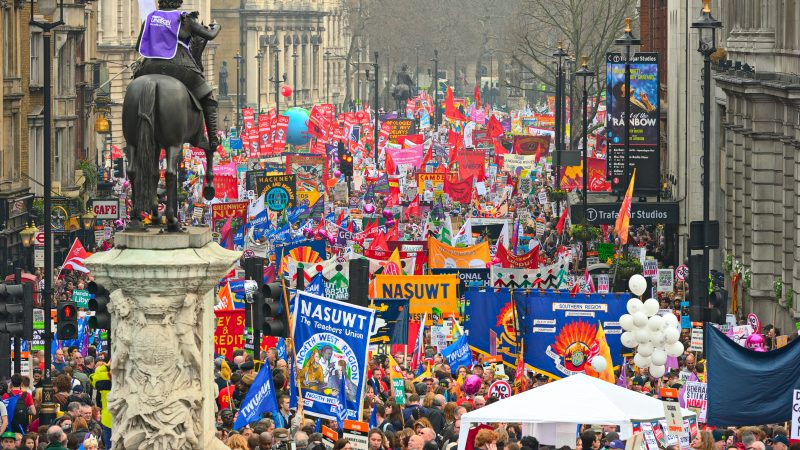
“Rights worth having are unruly things. Demonstrations and protests are liable to be a nuisance. They are liable to be inconvenient and tiresome, or at least perceived as such by others who are out of sympathy with them.” These were the words of one judge in a case concerning the Aldermaston Women’s Peace Camp, set up in the vicinity of an atomic weapons facility.
Keir Starmer knows as well as anyone that protest rights are rights worth having. As his leadership campaign video emphasised, during his career he represented many people making a stand against the injustices of the day and seeking to vindicate their rights to assembly and free expression. Those rights are once again under attack in the form of the police, crime, sentencing and courts bill. The most pernicious aspects of the proposals would target activists across our movement, and David Lammy’s confirmation that the Labour Party will vote against the bill this week is both welcome and right.
The Home Secretary, Priti Patel, has not disguised her contempt for the Black Lives Matter and Extinction Rebellion movements. The only surprise in the new bill is that those groups are not actually mentioned by name. It claims the changes are necessary because of protest tactics like people gluing themselves to buildings or blocking roads to an organisation. In fact, those tactics are far from novel, and I have represented countless people charged with offences arising from exactly such conduct. There is no gap in the law as the bill’s explanatory note claims.
The police currently enjoy a wide range of powers to control and restrict protest. Organisers of a planned march must notify the police in advance; police can seek the consent of the Home Secretary to prohibit a march if they fear it will lead to serious disorder; and they can impose conditions on demonstrations if they reasonably believe that it may result in “serious public disorder, serious damage to property or serious disruption to the life of the community”. If there are gaps in the current law, it has not prevented thousands of people participating in Extinction Rebellion and Black Lives Matter protests being arrested and prosecuted.
Priti Patel wants to lower those legal tests to make it easier for curbs to be imposed on protests. It would mean that noisy protests that may result in the “intimidation or harassment” of bystanders or cause them “serious unease, alarm or distress” can be curtailed, even where no such effect is intended by the participants. The bill also hands the Home Secretary the power to later define what terms like “serious unease” mean for the purposes of these offences. This removes parliament from the debate entirely: if that term and expressions like “serious disruption” are to be defined, then it should be done by parliament, not on the whim of a Home Secretary.
At present, after conditions are imposed on a static protest, it is an offence to knowingly fail to comply with any such requirement. Under these new government proposals, it will be an offence if a participant fails to comply with any condition that “they ought to have known” was in place. There is even a section that will surely become known as the ‘Steve Bray clause’: a provision aimed at “one-person protests”.
While the targets of this bill are undoubtedly obvious, the wider effect of the bill is equally clear. There is no reason why the sorts of marches and rallies frequently organised by the TUC could not infringe this legislation – and it would be wrong to assume that it could never happen. Marches from Embankment to Hyde Park are always lively, colourful and boisterous, filled with chanting and music precisely in order to attract attention to the issue or cause.
In another case in which Starmer himself appeared on behalf of anti-war protesters, a judge noted that “civil disobedience has a long and honourable history in this country”. The police, crime, sentencing and courts bill is a nakedly political attack not just on that history, but on some of the most well-supported and popular causes of the day. They are causes that are typically most enthusiastically supported in our movement and across the wider left.
Our party is right to side with those concerned with climate and racial justice, and not with an increasingly authoritarian Home Secretary who thinks nothing of vilifying desperate migrants and lawyers who represent them.




More from LabourList
‘Labour council candidates – it’s tough, but all is not lost’
‘Labour won’t stop the far right by changing leaders — only by proving what the left can deliver’
‘Cutting Welsh university funding would be economic vandalism, not reform’